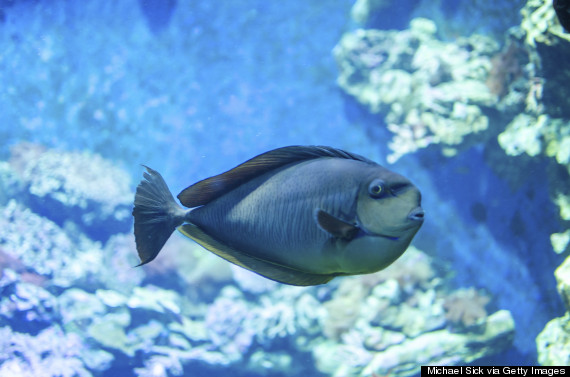Caribbean coral reefs are in critical danger, but a group of fish might be able to save them.
In a new report published this week, the International Union for Conservation of Nature warns that a majority of coral reefs in the Caribbean will disappear in the next 20 years. Corals in the region have already declined by more than 50 percent since 1970, authors note.
Drawing from more than 35,000 surveys of Caribbean reefs conducted between 1970 and 2012, a team of experts from the Global Coral Reef Monitoring Network detailed the drastic decline of the reef and highlighted threats to the delicate ecosystem. The largest threat, it seems, is not climate change, but the loss of a particular type of marine life.
"We saw that reefs with no grazers ended up getting smothered by algae. And after a period of time they see a significant or even complete collapse of the reef area," Carl Gustaf Lundin, director of IUCN’s Global Marine and Polar Program, told BBC News.
As authors write in the report, the population of parrotfish -- and other grazers, such as sea urchins, that consume algae and contribute to the health of tropical reefs -- has decreased significantly, primarily due to overfishing and pollution. However, if these types of fish are protected so that their numbers bounce back, Caribbean reefs have a good chance of recovering.
(Story continues below.)
A parrotfish, one of dozens of different species of the group of brightly colored fish, swims along a coral reef in the Caribbean.
"The rate at which the Caribbean corals have been declining is truly alarming," Lundin said in statement. "But this study brings some very encouraging news: the fate of Caribbean corals is not beyond our control and there are some very concrete steps that we can take to help them recover."
In the report, the team gives four recommendations and warns that all measures must be enforced if Caribbean coral reefs are to survive the next few decades.
The recommendations include:
- 1. Adopt robust conservation and fisheries management strategies that lead to the restoration of parrotfish populations...
- 2. Simply and standardize monitoring of Caribbean reefs and make the results available on an annual basis to facilitate adaptive management.
- 3. Foster communication and exchange of information so that local authorities can benefit from the experiences of others elsewhere.
- 4. Develop and implement adaptive legislation and regulations to ensure that threats to coral reefs are systematically addressed, particularly threats posed by fisheries, tourism and coastal development as determined by established indicators of reef health.
Coral reefs in the Caribbean are not the only reefs that may vanish completely in the near future. A recent report published by World Wildlife Fund-Australia indicated that the Great Barrier Reef faces "irreversible damage" if immediate action is not taken to reduce carbon pollution.
